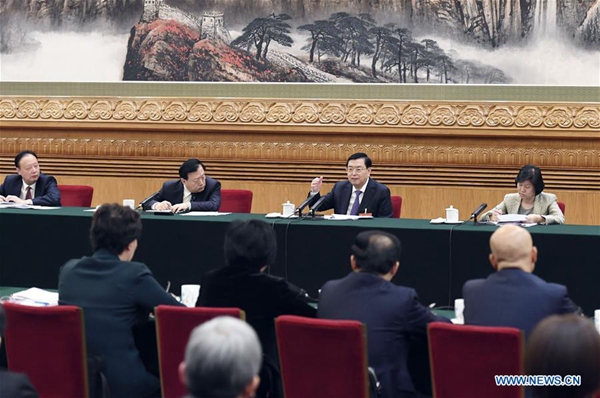Xi calls on Shanghai to lead way
President Xi Jinping said China will continue to open up in all respects, particularly in further liberalizing and facilitating trade and investment, while calling on Sunday for Shanghai to take a leading role in deepening reform and boosting innovation. Xi, also general secretary of the Communist Party of China Central Committee and chairman of the Central Military Commission, made the remarks during a panel discussion with Shanghai lawmakers at the National People’s Congress annual plenary session.
“The door of China’s opening-up will not close,” Xi said, mentioning that creating the pilot free trade zone in Shanghai was a strategic move by the CPC Central Committee.
The zone, inaugurated in 2013, has seen about 40,000 new enterprises emerge.
Shanghai also should make a difference in deepening free trade zone reforms, advancing the construction of scientific innovation centers and social governance innovation, and strengthening CPC discipline, Xi said.
The president said the city should be bold in its pilot projects, expanding its role as a testing ground for further reform and opening-up. He also urged the city to push forward with free trade and facilitation of investment. Its free trade zone should become a bridgehead for the country’s Belt and Road Initiative and help market entities go global, he said. That way, Shanghai can achieve innovative results that can be adopted by other regions.
China faced a complex global situation and downward pressure on its domestic economy in the past year, but the nation kept “seeking progress while maintaining stability”, pushed forward on supply-side structural reform, and achieved its goals of economic and social development, Xi said.
The president recognized the achievements of Shanghai authorities in the past year in areas such as boosting innovation, optimizing economic structures and deepening reform.
The key to the supply-side structural reform is innovation, Xi said. He urged breakthroughs in key technology areas. He also advocated educational reform to create the talent needed for the country’s development.
Xi said Shanghai should explore new ways of social governance that fit a super municipality. He suggested use of information technology, including the internet and big data, to enhance intelligent city management to make the city more orderly, safer and cleaner.
The president also vowed to strengthen the discipline of the Communist Party of China. Party leaders must shoulder their responsibility in clean-governance supervision, he said.
